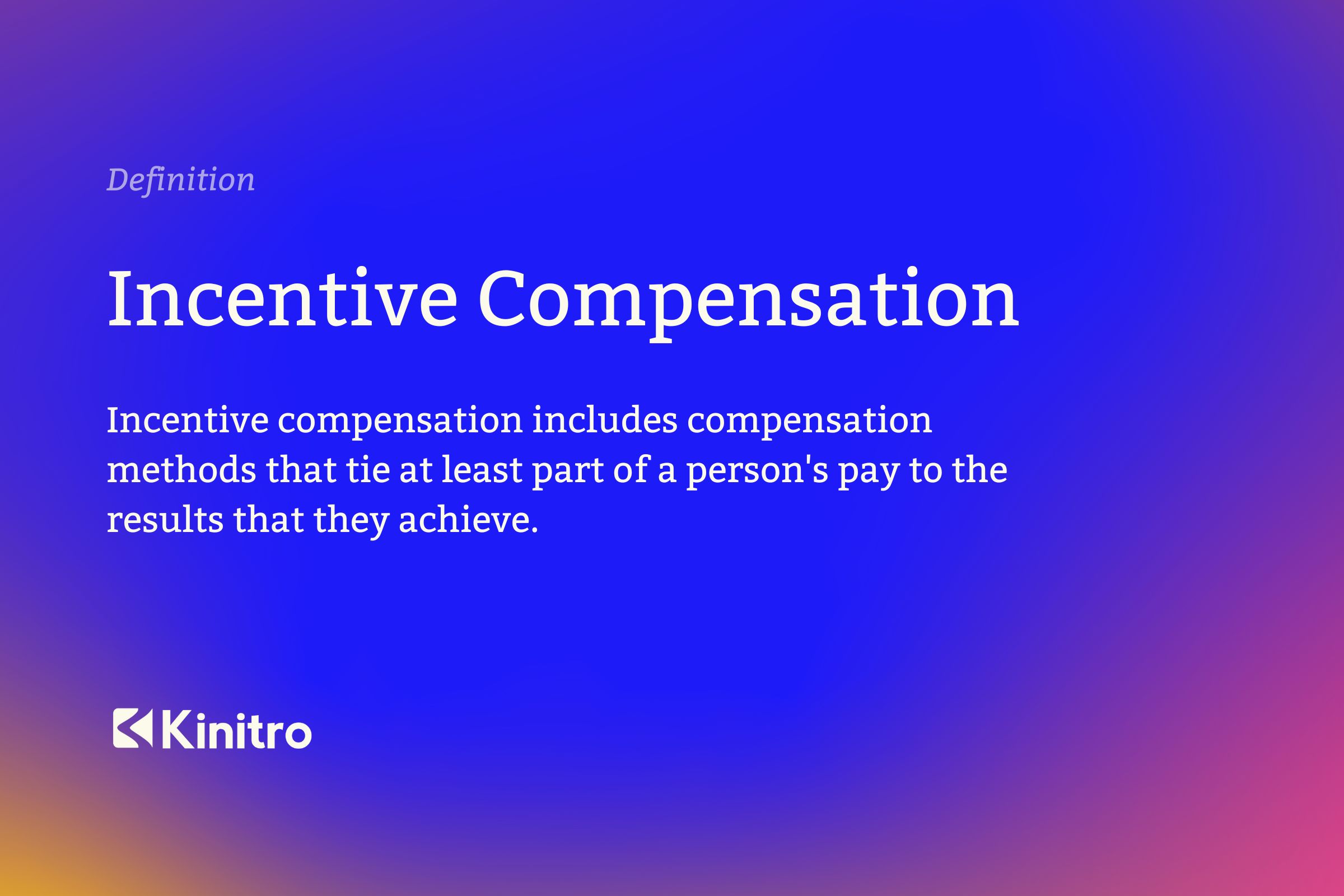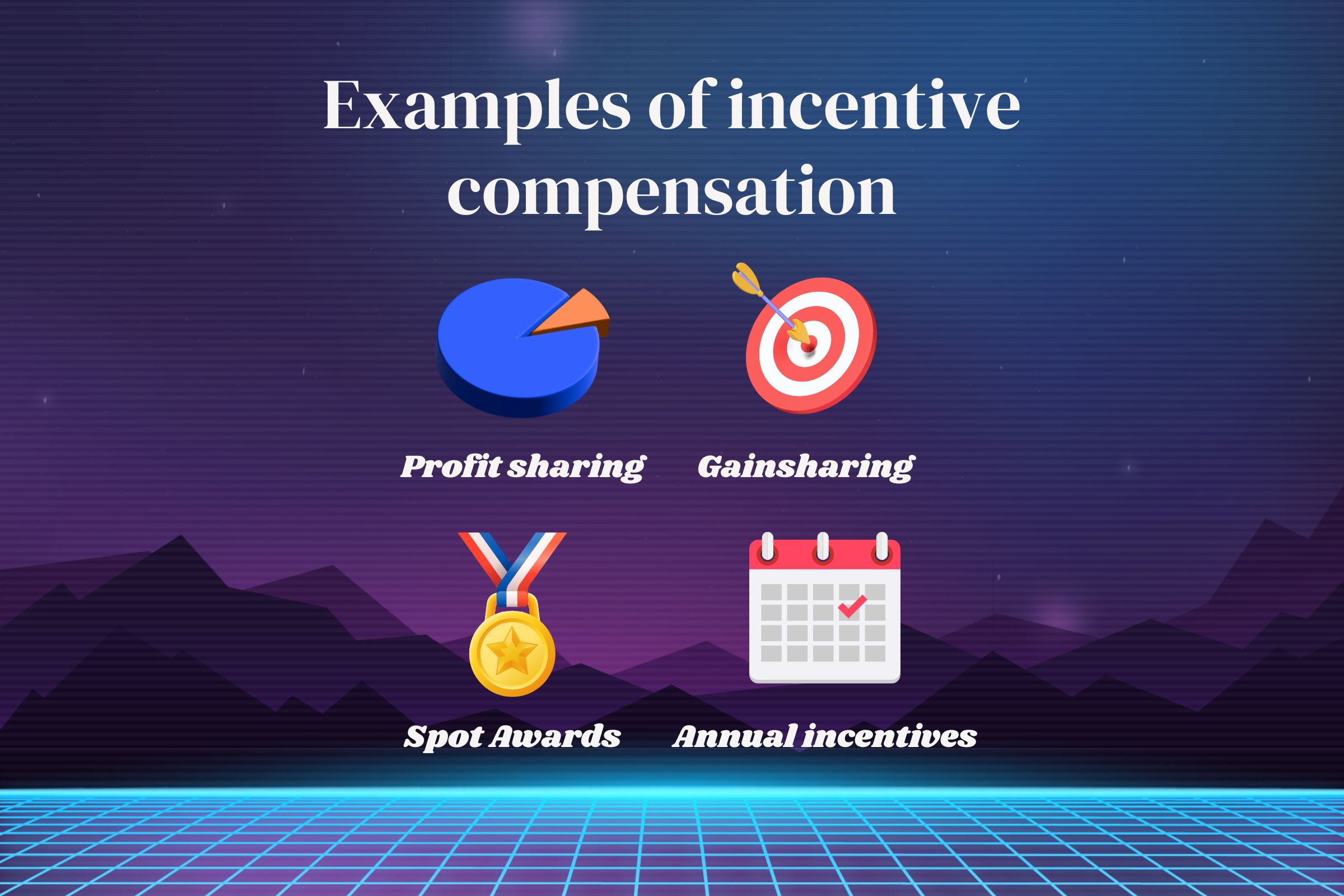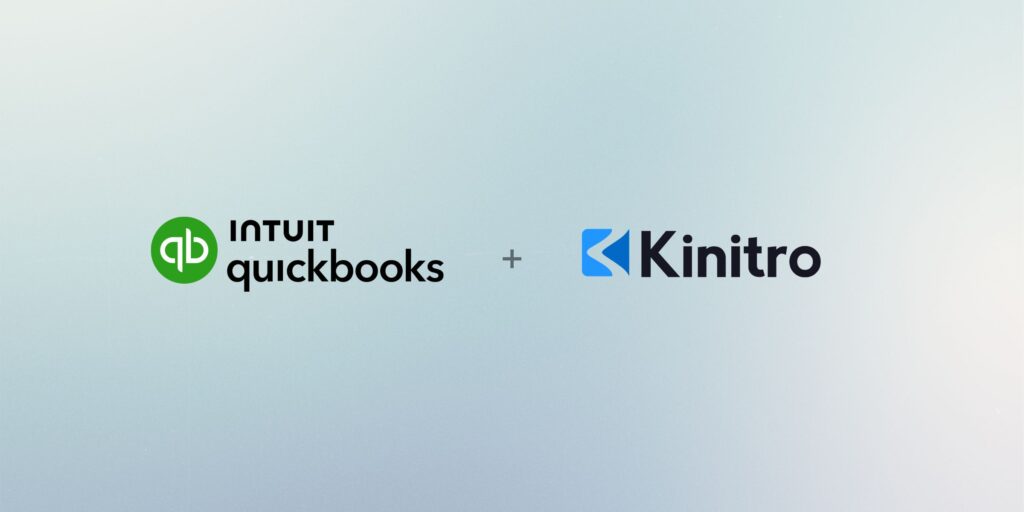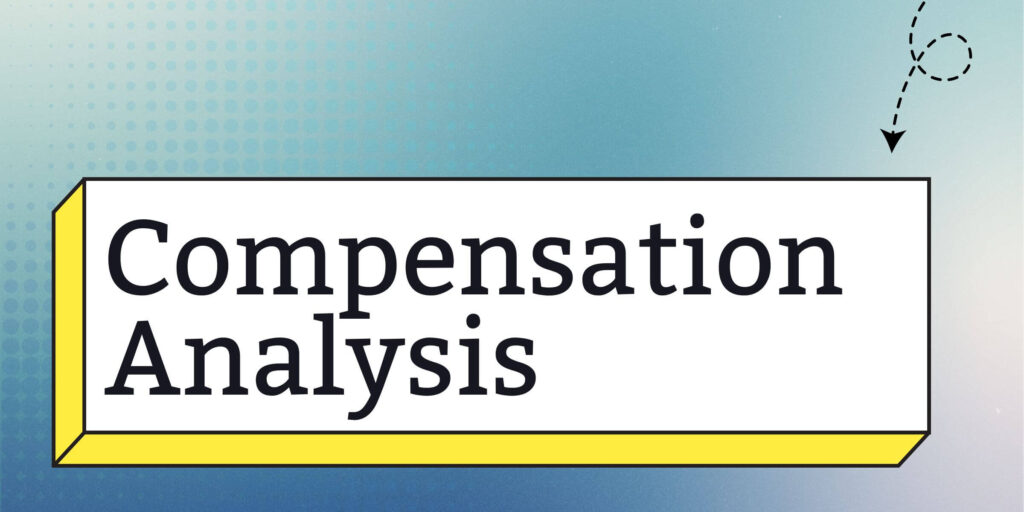Incentives are methods of motivating people, not just rewarding them for their work but giving them a reason to work harder and achieve results. Incentives can come in many forms, including monetary incentives, which are often employed in sales teams.
Incentive compensation plans are a popular and effective way of motivating sales teams. They are used to drive sales and influence sales behavior by tying sales performance to the compensation that team members receive. Any business that wants their sales team achieving performance goals can benefit from implementing an incentive compensation program.
In this post we will discuss, what is incentive compensation, why it is important, and how sales leaders can implement an effective incentive compensation plan.
Table of Contents
- What is incentive compensation and why is it important?
- Examples of incentive compensation
- How to implement an incentive compensation program
The Definition of Incentive Compensation
Incentive compensation includes compensation methods that tie at least part of a person’s pay to the results that they achieve. It will often be referred to as commission, being the extra pay that salespeople are given on top of their base salary for each of the sales that they close.
90% of top-performing companies use incentive programs to reward their sales associates, showing that it’s one way of effectively motivating organizational performance.

What Does Incentive Compensation Include?
Incentive compensation can come in many forms, such as bonuses, stock options, profit-sharing payments, commission-based incentives, and awards.
The most common types are annual bonuses based on individual or team performance and long-term incentive plans that involve multiple years of performance goals.
The Importance of Incentive Compensation Programs
Incentive compensation programs are an important part of any successful sales team because they provide motivation for employees to reach their goals. They create a competitive environment, which encourages sales teams to stay motivated and work hard to exceed expectations.
Incentive programs can also help promote team unity and collaboration among sales team members, as they strive to achieve the same objectives together. Finally, incentive compensation plans can help increase customer satisfaction, as employees know that their efforts will be rewarded for providing excellent customer service.
By offering incentive packages, companies can ensure that their employees are properly incentivized to maximize performance and reach desired outcomes.
Examples of Incentive Compensation
There are various ways incentive compensation can be implemented to motivate team members. Different models can help to produce different results and motivate people in varying ways.
Spot awards
Spot awards include both financial or other small incentives that are given in recognition of short-term performance achievements. Spot awards are typically given for demonstrating outstanding employee performance or service. They are usually awarded on the spot, often in the form of an unexpected financial bonus or gift.
A spot award example is giving out a cash bonus to your top performing sales representative each quarter.
Spot awards can be used to reward an employee’s performance or team efforts, and they serve as a powerful motivator for sales reps, helping them feel appreciated and recognized for their hard work.
Spot awards can also inspire others to do their best and strive for excellence. In addition, they help boost morale in the workplace, enabling employers to recognize employees when they go above and beyond their expectations.
Profit sharing
Another incentive compensation example is profit sharing. Profit sharing gives employees the chance to benefit from a share of the company’s profits. However, there is a slight difference in that instead of being rewarded for individual performance, employees are rewarded for the overall profitability of the business.
The practice of distributing a business’s profits to its employees can be done in various ways, such as through an equal share to all staff, a bonus system based on performance, or a combination of both.
Benefits include increased employee motivation, engagement, and loyalty, which can lead to improved business performance and overall success. Additionally, it can also create a stronger culture within the organization as employees are more likely to work together for a common goal.
Gainsharing Plan
A gainsharing plan is a type of incentive compensation involving offering financial shares of the business gains to employees. When their performance results in higher gains for the business, those profits can be shared among the individuals who helped to make it happen.
Gainsharing is a performance-based incentive program that rewards employees for achieving company goals. Gainsharing programs include incentives such as a bonus, commission, or other reward for meeting specific objectives.
These objectives can be based on various metrics such as sales volume, customer satisfaction ratings, and employee productivity. Unlike traditional pay for performance plans which focus on individual efforts, gainsharing programs are usually collective efforts that benefit the entire organization.
When a company implements a gainsharing program, it sets predetermined performance measures and results that must be achieved in order to earn the incentive payout. Once those business goals are met, the bonus amount is shared among the employees who contributed to the success of the company. This encourages team building and collaboration between employees while giving them an extra motivation to strive for better results.
Gainsharing programs can also have positive effects on organizational culture by creating a sense of ownership among employees. The rewards offered by these types of programs tend to bring out higher levels of engagement amongst staff members who feel they are being rewarded directly for their hard work and contributions. Additionally, these types of plans can help increase employee retention rates by providing recognition and financial rewards for reaching organizational targets.
Retention bonuses
A retention bonus is an incentive plan offered to employees to entice them to stay with an organization. It is typically paid out in the form of cash, stocks, or other bonuses based on the employee’s performance and tenure with the company.
Retention bonuses are often used as a way for employers to reward long-term service or exceptional performance, and they can also be used to encourage loyalty among existing staff members.
They may also be used to attract new talent by providing an extra incentive for potential employees when making their decision about which company they’d like to join.
Retention bonuses are becoming increasingly common in industries where competition for talent is high and turnover rates are significant.
Annual incentives
Annual incentives are usually given in the form of yearly bonuses in addition to an employee’s base salary. They are awarded to employees at the end of the financial year as a single annual bonus that is calculated based on the performance of the employee during that year.
Annual incentives are designed to encourage employees to work towards long-term goals and to remain with the company over the next year and beyond. Companies that offer annual incentives often find that their employees are more engaged and productive, resulting in better overall business performance.

Implementing an Incentive Compensation Program
To successfully implement an effective incentive compensation plan for your organization, you must ensure that all key stakeholders understand how the incentive plan and its compensation structure align with company strategy.
When setting up your incentive compensation plan, you should consider the following factors:
- the size of the reward (i.e., how much money or what type of award)
- who will receive it (i.e., individual or team)
- when the reward will be given (i.e., quarterly or annually)
- what criteria need to be met for an employee to receive the reward (i.e., sales goals)
- how difficult it is for an employee to meet those criteria (i.e., easy versus hard)
It is important to create an equitable system where employees are rewarded for their hard work but also incentivized to continue working hard in order to reach their goals.
Testing Incentive Compensation Plans
Before reaching the implementation phase, you should also test your incentive plans to make sure you have an effective program that aligns with business needs.
Scenario modeling is an important tool for incentive compensation plans as it helps employers predict the impact of their plans and modify them accordingly. Scenario modeling allows employers to test different scenarios, such as what happens when a certain goal is met or how an increase in sales affects performance. This enables employers to create incentive plans that maximizes return on investment while still providing sales reps with incentive payouts that are both fair and motivating.
It also allows employers to anticipate potential problems with their incentive compensation plans and make changes before they become issues. For example, if testing showed that meeting certain goals would result in too large of a bonus payout, the plan administrators could adjust the plan accordingly to ensure financial stability within the company. Additionally, back testing can be used to identify sales representatives who are performing well in order to reward them appropriately.
Overall, scenario modeling is an incredibly useful tool for incentive compensation management as it allows employers to evaluate the impact of their plans before implementing them and make changes quickly if necessary in order to ensure that the plan works effectively for both parties involved.
7 Tips for Implementing a Successful Incentive Compensation Plan
With so many different types of plans available, it can be tricky for sales managers to choose the best one. With this in mind, here are seven tips for setting up a successful incentive compensation plan that will help get your team motivated and boost those sales numbers.
Set clear and measurable goals for sales and other performance metrics
Setting clear and measurable goals for sales and other performance metrics is crucial for any business. By doing so, you can effectively track progress toward objectives and identify areas that require improvement. Measurable goals can also help motivate employees, making them more invested in their work and more likely to achieve success.
However, it’s essential to ensure that your goals are both attainable and relevant to your business needs. Additionally, regularly reviewing and adjusting your goals can help you stay on track and adapt to changing market conditions.
With clear and achievable targets in place, your business can reach new heights and achieve long-term success.
Develop a reward system that is tailored to the employees’ accomplishments
One size does not fit all, especially when it comes to rewarding a sales team for their accomplishments. A tailored reward system is necessary to keep motivation high and enhance productivity within a company.
After all, employees who feel appreciated and recognized are more likely to continue working hard and achieving great success. To create a personalized reward system, it’s important to consider the specific accomplishments of each employee and base rewards on what they value the most.
While money and bonuses may be appreciated by some, others may find more value in extra vacation time or a catered lunch. By acknowledging the unique accomplishments of each employee and creating a tailored reward system, companies can promote a positive and productive work environment that will attract and retain top talent.
Establish an effective communication plan to provide ongoing updates on the incentive program
In today’s fast-paced business world, communication is key. Establishing an effective communication plan is essential to ensure the success of any initiative, especially an incentive program. With various moving parts and multiple stakeholders involved, it’s crucial to provide ongoing updates to keep everyone on the same page.
By implementing a well-crafted communication plan, you can ensure that all team members are aware of the latest developments, deadlines, and achievements needed to meet their compensation plan objectives. Not only will this foster a sense of transparency and accountability, but it will also keep motivation levels high and drive engagement throughout the project.
So, let’s start devising a communication plan that will keep everyone in the loop and maximize the success of your incentive program.
Offer multiple types of awards such as cash bonuses, trips, or additional time off
Every employee has their own set of motivators and incentives. While some may prefer monetary bonuses, others may value experiences or time off more. That’s why offering multiple types of awards in a compensation plan is a smart move for any company.
Perhaps your top performer on the sales team would love a luxurious trip somewhere they’ve always wanted to go. Or maybe the creative team would appreciate an extra day off to recharge their batteries.
By diversifying the available awards, you ensure that all employees have a chance to be rewarded in a way that’s meaningful to them. This can boost morale, loyalty, and overall productivity within your team.
Make sure the program is fair and equitable across departments
In a world where fairness and equity are more important than ever, it’s crucial to ensure that incentive payouts reflect those values. This is particularly important when it comes to departments within a company or organization.
We all want the opportunity to succeed and thrive in our respective roles, and having an incentive compensation plan that is fair and equitable across departments helps ensure that this is possible. It means that every department is given the same opportunities for growth and development, and that success isn’t limited by factors that are outside of our control.
By prioritizing fairness and equitability in our incentive pay, we create a workplace that is more inclusive, supportive, and ultimately, more productive.
Utilize data analytics to track progress and measure success
Data analytics can help sales managers make better decisions about their incentive plans. With the right incentive compensation management software, organizations can gain valuable insights into overall performance of incentive programs.
By analyzing data and identifying trends, organizations can take proactive steps towards implementing the right financial rewards that increase sales performance and achieve business goals.
In summary, incentive compensation is an important part of motivating and rewarding employees. It has a wide range of benefits for employers as well as employees. When implementing an incentive compensation plan, be sure to consider the goals that are most important to your organization and test the program regularly until you achieve the desired outcomes.
Investing time upfront into creating an effective plan will aid in gaining maximum results with the minimum amount of disruption. Learn how Kinitro’s incentive compensation management software can help your team maximize their performance potential with automated processes for implementing, monitoring and managing incentive compensation plans quickly and easily.







